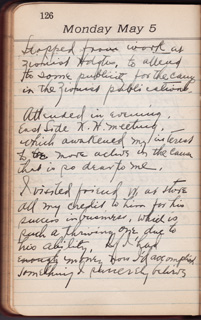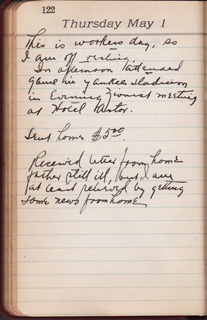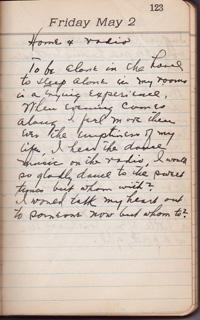
Stopped from work at
Zionist Hdqtrs. to attend
to some publicity for the camp
in the Zionist publications.
Attended in evening,
East Side K.H. meeting,
which awakened my interest
to be more active in the cause
that is so dear to me.
I visted friend W. at store
All my credit to him for his
success in business, which is
such a thriving one due to
his ability. If I had
enough money now I’d accomplish
something I sincerely believe.
——————–
Matt’s Notes
Like so many New Yorkers before and after him, Papa worked a day job, attended to his more heartfelt pursuits in the evening, and counted a good night’s sleep among his lower priorities. Since this is so typical, and also because Papa rarely mentions work in his diary, it hasn’t yet occurred to me to ask what his working hours were actually were.
I think the eight-hour work day was established for garment factory workers by 1924, so Papa may well have knocked off at four or five o’clock. (I’ll have to look into this more, but even if the eight-hour day wasn’t official, I’m sure Papa’s factory, which still recognized May Day as a worker’s holiday, hewed to progressive union rules.) This would have given him a decent amount of time to attend to his evening responsibilities, though it still would have been a bit of a scramble.
The “headquarters” he visited were likely the Zionist Organization of America offices at 114 Fifth Avenue (at 16th Street) and the “publicity” he attended to was probably some kind of writeup about his chapter of the Zionist fraternal organization B’nai Zion (an announcement about the initiation ceremony he presided over the day before?) for Dos Yiddishe Folk, the Z.O.A.’s weekly publication. It’s possible that “headquarters” also meant B’nai Zion’s main office at 44 East 23rd Street, but in any event they likely ran all their publicity through the Z.O.A. since they were originally a Z.O.A. spinoff.
So, you might ask, in light of all his running around and hard work, how could he attend a meeting of Keren Hayesod (a Zionist fundraising group) and come away thinking he wasn’t doing enough for his cause? It’s hard for me to answer objectively since I never think I do enough of whatever I do and pretty much motivate myself entirely be being dissatisfied with what I have; I can only assume Papa had the same feelings as a young man and, perhaps, passed the trait down to me. In fact, I need to wrap up this post right now because I have to be somewhere, and I’m entirely sure this post is abysmally incomplete. (Watch for me, stomping down the street in a shitty mood, in about five minutes).
Here are the questions I still wish I’d written about:
- Why did Papa refer to his friend “W.” only by his first initial? Did he not want to bring the evil eye on his successful business?
- What does Papa think he’d accomplish with more money? Help the Zionist cause? Run for office? Give more to charity?
- When did Papa learn to judge his life on what he had rather than on some abstract sense that he was supposed to be doing something else, something more, something different? And when will I, for God’s sake?












